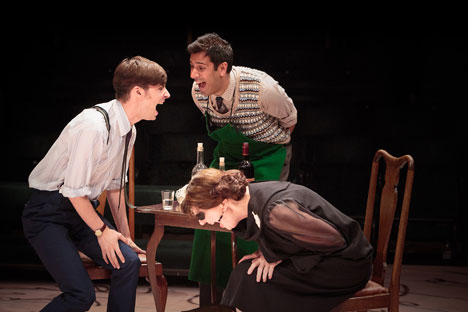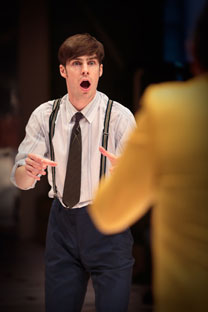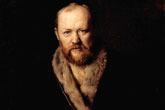
(l-r) Dyfan Dwyfor as Yegor Dimitrich Gloumov, Nitin Kundra as Styopka and Penelope Dimond as Glafira Klimovna Gloumova in TOO CLEVER BY HALF (Royal Exchange Theatre until 17 August). Source: Jonathan Keenan
The censor’s report on Alexander Ostrovsky’s first full-length
The Tsar banned the play, but later his status was assured and his work is still topical and entertaining. Today he is one of Russia’s most popular and often-performed playwrights.
 |
| Dyfan Dwyfor as Yegor Dimitrich Gloumov in TOO CLEVER BY HALF. Source: Jonathan Keenan |
So why have most of us in the west never heard of him?
Jacqui Honess-Martin, who recently directed the English language premiere of Ostrovsky’s “Bespridannitsa” (“Girl with no Dowry” or “Fiancée without Fortune”) at London’s Arcola Theatre, has several possible answers: “British theatre doesn’t do a lot of foreign classics,” she explained. “It tends to be Ibsen and Chekhov and that’s about it. We’re very comfortable doing
Renamed “Larisa and the Merchants,”
In the U.S., Ostrovsky is no Chekhov
American theaters are still struggling in their efforts to bring Ostrovsky to new audiences. In 2010, Ostrovsky was produced in New York. "Ostrovsky has mostly retreated to the textbooks outside of his own country," Charles Isherwood said in The New York Times. "Hats off, therefore, to Classic Stage Company’s production of “The Forest,” one of Ostrovsky’s better-known comedies, performed by a talented cast led by Dianne Wiest, who plays the miserly mistress of a large estate, and John Douglas Thompson (“Othello,” “The Emperor Jones”) as her nephew, an itinerant actor who comes to pay a visit."
Unfortunately, the show was not a hit at all—quite unlike many Chekhov productions. "The production is a commendable attempt to shine a light into an obscure byway of the classical canon, but memorably moving or memorably funny it is not. It may be unfair to belabor the comparison, but you could plausibly label it Chekhov Lite." Isherwood said.

Discovering the triumph and tragedies of Russia's Shakespeare
John Freedman explains why Ostrovsky is the Shakespeare of Russia
This did not exactly open the way for more Ostrovsky, but a year ago, in 2012, an adventurous theater in New York called "Blessed Unrest" tackled "The Storm." In this production, many liberties were taken to create a contemporary and conceptual work. The review in Backstage was both positive and mixed.
The London stage, however, is beginning its own love affair with Ostrovsky.
“I first read this play in 2008 and it seemed very prescient,”
Sergei Ostrovsky, Pushkin House
Sergei Ostrovsky praised the new version by Samuel Adamson, which was “a pleasure to watch … snappy and modern without being silly about it” and reported some very positive reactions from Russian audience members, “who were excited to see a different version of a story they all grew up with.”
Honess-Martin added that foreign directors can bring something fresh to the Russian playwright’s works: “Freed from that cultural baggage, of
Samuel Adamson’s new translation is available from Faber and Faber.
New productions of Ostrovsky’s “A Family Affair” and “
A play 'Too clever by half' by Alexandr Ostrovsky, adapted by Rodney Ackland will run in Royal Exchange Theatre until August 17, 2013.
All rights reserved by Rossiyskaya Gazeta.
Subscribe
to our newsletter!
Get the week's best stories straight to your inbox